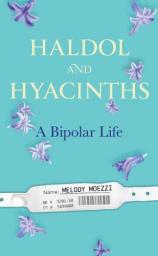About the Book
About the Book
Haldol and Hyacinths

At eighteen, when Melody Moezzi began battling a severe physical illness, her close-knit Iranian-American community stepped up, filling her hospital rooms with roses, lilies, and hyacinths. But when she attempted suicide and was diagnosed with bipolar disorder years later, there were no flowers. Despite several stays in psychiatric hospitals, she was encouraged to keep her illness a secret --- by both her family and an increasingly indifferent medical establishment. Melody quickly realized that “there’s no pride in being a mental patient”. But in writing HALDOL AND HYACINTHS, she began to overcome her shame, fear and silence in the hopes of inspiring others to do the same.
At twenty-six, Melody was happily married to her college sweetheart, Matthew, nearing completion of her law and Master’s degrees, and finalizing work on her first book, WAR ON ERROR. To the outside world, she was not a candidate for suicide. But Melody had struggled with the highs and lows of undiagnosed and untreated manic-depression for years by that point. Desperate to escape the torment, she tried to take her own life. But she failed, instead finding herself on her first psychiatric ward.
At the time, her greatest concern wasn’t her health or liberty. Rather, it was the possibility of being outed: “‘It’s just really important that none of the Iranians find out,’” she told Matthew.
Born to Persian parents at the height of the Islamic Revolution and raised amid a large and vibrant Iranian diaspora in Dayton, Ohio, Melody fit the stereotype of the overachieving child of immigrants to a tee. Now she feared becoming the object of gossip among the community. Mental illness was not something that was discussed among the Dayton Iranians --- despite the fact that the great majority of them were physicians, including both of Melody’s parents. In Melody’s words, Iranians are “about as likely to discuss their psychological issues as they are to discuss their bowel movements".
So as Melody’s struggles culminated in “three separate psychiatric hospitalizations and an ever-expanding personal pharmacy”, she remained terrified that her mental illness might become public knowledge, shaming her family and shocking her community. In time, however, Melody realized that keeping quiet about mental illness doesn’t make it go away.
Since childhood, Melody has been “an instinctive and intractable activist” (p. 45). So she couldn’t help but recognize that the ignorance, stigma and discrimination surrounding mental illness was no different than that surrounding race, religion, nationality, gender or sexual orientation. As an inveterate human rights activist, she had worked on all those issues, and by the time she went public with her illness in an online commentary for NPR some six months later, she knew that she had a new cause.
Today, through her writing and public speaking, Melody campaigns to raise awareness about mental illness for fellow-sufferers of all backgrounds. Blisteringly honest, poignant, and surprisingly funny, HALDOL AND HYACINTHS is the riveting and provocative first-person account of one bipolar survivor who “swam to save the others, only to find, upon reaching shore, that they had saved 'her'”.
Haldol and Hyacinths
- Publication Date: August 1, 2013
- Hardcover: 304 pages
- Publisher: Avery
- ISBN-10: 1583334688
- ISBN-13: 9781583334683


